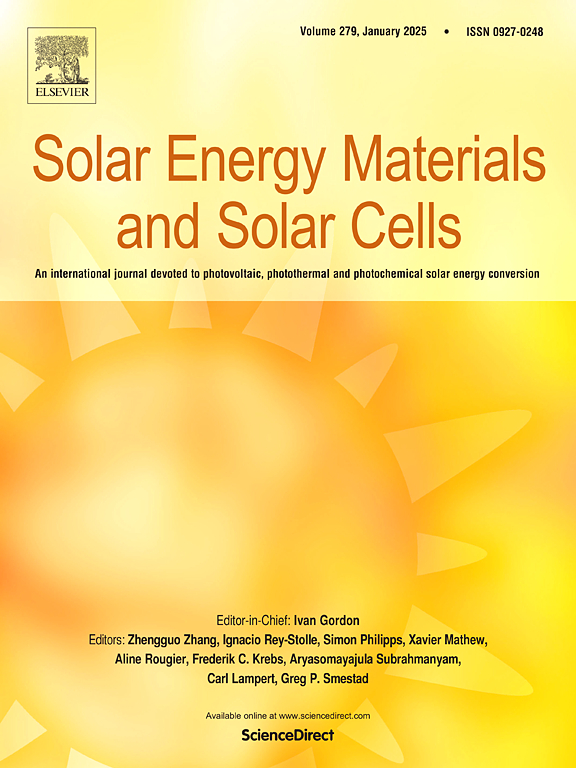Weather resistant low-e coatings on polycarbonate substrates transparent to 5G signals
IF 6.3
2区 材料科学
Q2 ENERGY & FUELS
引用次数: 0
Abstract
Low emissivity (low-e) windows contain a semi-transparent multilayer coating that consists of ultra-thin metallic and dielectric layers (nano-scale) which block the infrared (IR) radiation from the Sun. However, there are two major drawbacks in the technology: firstly, the lack of environmental stability due to the metallic content in the low-e coating. Secondly, the metallic layers attenuate modern-day telecommunications such as Fifth Generation (5G) signals. As there is an ever-increasing demand to reduce energy consumption plus having reliable interior-to-exterior signal coverage, a smarter design for low-e windows is required. In this study, low-e coatings, with the structure TiO2/NiCr/Ag/NiCr/TiO2, were deposited on polycarbonate (PC) substrates by magnetron sputtering. To improve environmental stability, a transparent siloxane resin was applied on top. To enhance the 5G signal transmittance, the Frequency Selective Surface (FSS) technique was applied, and hexagonal patterns were laser ablated from the Ag layers. The samples were characterised using spectrophotometry, signal attenuation measurements, salt spray tests, and both accelerated and outdoor weathering. This work demonstrates that the FSS patterning improves the low-e coating transmittance to 5G signals, and the top protective coating contributes to extend the lifetime of the coatings as demonstrated by aggressive durability tests.
聚碳酸酯基板上的耐候性低辐射涂层对 5G 信号透明
低辐射(low-e)窗户包含一层半透明的多层涂层,由超薄金属层和介电层(纳米级)组成,可以阻挡来自太阳的红外线(IR)辐射。然而,该技术有两大缺点:首先,由于低辐射涂层中含有金属成分,因此缺乏环境稳定性。其次,金属层会衰减第五代(5G)等现代通信信号。由于人们对降低能耗和实现可靠的室内外信号覆盖的需求日益增长,因此需要对低辐射窗户进行更智能的设计。在这项研究中,采用磁控溅射技术在聚碳酸酯(PC)基板上沉积了结构为 TiO2/NiCr/Ag/NiCr/TiO2 的低辐射涂层。为了提高环境稳定性,还在上面涂上了透明的硅氧烷树脂。为了提高 5G 信号的透射率,采用了频率选择性表面 (FSS) 技术,并用激光从银层上烧蚀出六边形图案。利用分光光度法、信号衰减测量、盐雾测试以及加速和户外老化对样品进行了表征。这项工作表明,FSS 图案设计提高了低辐射涂层对 5G 信号的透射率,而顶部保护涂层则有助于延长涂层的使用寿命,这一点已在侵蚀性耐久性测试中得到证实。
本文章由计算机程序翻译,如有差异,请以英文原文为准。
求助全文
约1分钟内获得全文
求助全文
来源期刊

Solar Energy Materials and Solar Cells
工程技术-材料科学:综合
CiteScore
12.60
自引率
11.60%
发文量
513
审稿时长
47 days
期刊介绍:
Solar Energy Materials & Solar Cells is intended as a vehicle for the dissemination of research results on materials science and technology related to photovoltaic, photothermal and photoelectrochemical solar energy conversion. Materials science is taken in the broadest possible sense and encompasses physics, chemistry, optics, materials fabrication and analysis for all types of materials.
 求助内容:
求助内容: 应助结果提醒方式:
应助结果提醒方式:


